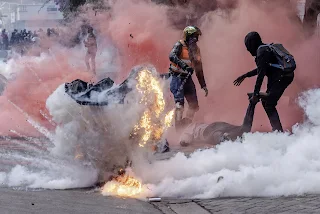In
June 2024, the core of Kenya's capital city, Nairobi, was shaken not only with
shouts of protest but also with the unmistakable report of gunfire. What had
begun as a peaceful 
photo | world press photos
protest regarding a contentious finance bill was devolving
into violence on the grounds of Parliament — the very body that was supposed to
act on behalf of the people.
The
BBC Africa Eye documentary "Blood Parliament" shines a biting light
on events of that fatal day, bringing together footage, interviews, and
investigative journalism to raise a grisly question: Was there anything that
made spilling blood at Kenya's parliament grounds worthwhile?
A
Nation's Debt, A People's Rage
The
reason behind the unrest was the government's 2024 Finance Bill, a bill which
sought to impose more taxes on ordinary commodities. President William Ruto's
administration justified the bill as pressing in the country's runaway debt.
"We
need to be in a position to improve our taxes," Ruto stated, staying true
to his promise not to govern a bankrupt nation.
But
to the majority of Kenyans — particularly the youth — the bill was a badge of
rising inequality and deafness on the part of government. In a country where
billions are stolen by corruption every day and the political class indulges in
luxury, the idea of taxing basic commodities even further seemed not only
unjust, but merciless.
Gen
Z Rising
In
what became a historic civic uprising, over 100,000 protesters — mostly young
Kenyans, dubbed “Gen Z” — flooded Nairobi’s streets on June 25th, 2024. Their
aim? Occupy Parliament peacefully. Their chant? “It’s a people’s assembly. It
belongs to the people.”
Armed
with nothing more than signs and determination, they faced off against police
officers who initially used the deployment of tear gas and batons. But with
more people and raising tempers, so did the ferocity.
"We
even had our hands up, crying out, 'We are peaceful, we are peaceful.' And they
still shot people."
Three
young men – David Chege, Erickson Matissia, and Eric Shieny – were shot dead
with live ammunition at the steps of Parliament.
photo | world press photos
A
Battle of Narratives
President
Ruto later spoke to the nation, stating that the protests had "been
hijacked by a group of organised criminals." He lamented the deaths but
justified the police response.
To
date, no official report has been issued, and nobody has been held accountable
for the killings.
This
quiet only added fuel to suspicion and rage. As a counterargument, BBC Africa
Eye conducted an investigation of its own, geotagging over 5,000 pictures and
videos in order to recreate the events and determine who had done it.
"You
could see he's clearly aiming. Meaning, he was aiming to kill — as a message to
them."When Democracy Is Met with Bullets
The
documentary doesn't just lay bare facts; it indicts a system in which peaceful
demonstration is conflated with rebellion, in which responsibility is the
illusion, and where the cost of civic engagement might be a short life lost.
"Was there any reason to spill blood on the grounds
of Kenya's parliament?"
That
remains an open question, echoing through the country's political and moral
landscape.
The
Verdict of a Generation
This
uprising, while caused by taxes, is as much about policy as it is not policy.
It's about respect, justice, and the right to be heard. Kenya's Gen Z has been
heard, not just as a demographic, but as a political force — a generation that
will no longer stand for silence, corruption, and impunity.
Their
blood has been spilled. Their voices have been heard. Whether or not those in
charge will now hear them is to be determined.

Comments
Post a Comment
thank you for visiting this site . Hope for more posts